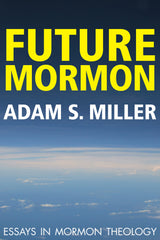Q&A with Adam S. Miller, author of Future Mormon: Essays in Mormon Theology April 15 2016
Pre-order your copy today.
It is difficult to be contemporary. Historians can avoid the trouble of being contemporary by writing about history and the history of ideas. But as a philosopher and theologian, I think the other tack is more appropriate. Rather than taking shelter in the past, my work takes shelter in the future. It takes future Mormons as it audience. I can't claim any kind of authority in the present, but my hope is that my work might be useful down the road for my grandchildren and great grandchildren. No one, right now, is asking me to write anything or think harder about anything. That's understandable. But maybe I can still be useful and leave something behind that could be helpful in the future.
Q: How does this new volume differ from Rube Goldberg Machines?Future Mormon is, I think, a stronger collection of essays. They are more tightly integrated around a handful of key themes and, while they frequently remain academic in spirit, they are, in general, less playful or poetic and more straightforward than some of the material in Rube Goldberg Machines.
Q: In the introduction you describe your book as a “future-tense apologetics.” In what ways is your book apologetic, and how does it differ from how apologetics is traditionally understood?
The book is apologetic in that it offers a defense of Mormonism. But it is different from conventional forms of apologetics because it doesn't attempt to defend Mormonism against the specifics of any past or present criticisms. Rather than supplying specific answers to specific questions, I think these essays, instead, try to gather potential tools and resources that future Mormons may need to tackle problems that, for us, may be only barely perceptible at present.
Q: When you look at the generations coming up, what do you suspect will be the most pressing issues for them as they navigate their relationship with Mormonism? And how does Future Mormon address those issues?
The most pressing issue will be Christ. Future generations will have to—just as we must—figure out how to not just talk about Christ but live life in Christ. Life in Christ is the perpetual challenge. They, however, will also have to figure out what such a life looks like in a world that, increasingly, takes sexual, racial, and economic equality seriously, all while dealing with profound and planet-wide ecological changes.
Q: As does much of your work, this book focuses a good deal on grace. This is a topic that has received much more traction in Mormonism today than it did in the past. Why do you think this is the case, and how does your understanding of grace differ from how Mormons generally view it?
Grace is just one way of talking about what life in Christ looks like. But it is a good way. It is language native to Christianity's earliest and most influential expression. For my part, I think that Mormons generally use the word in a way that is still too narrow, still too secondary. We need something like a general theory of grace. In this book, I try to open up some accessible lines that could help us think about what a general theory of grace would involve.
Q: In one of your essays, you say that Mormons need to learn to be more Pauline. In the last several decades there has been a growing interest in Paul by philosophers--and even atheist philosophers. What has drawn their interest, and what is it about Paul that Mormons have generally failed to learn from?
Paul's message, as an apostle of Christ, has perennial traction, with Christians and non-Christians alike. In his letters Paul is trying to describe what a certain kind of life, an awakened and liberated life, looks like. This kind of life—whether someone comes to it by way of the Christian tradition or more directly by way of life itself—has a kind of universal appeal. If atheists aren't interested in the theological work that we're doing, then we're probably doing it wrong. Paul, though, is a good example of doing it right.

